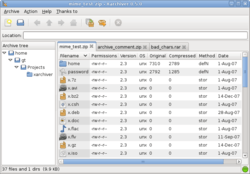Xarchiver
 | |
| Developer(s) | Giuseppe Torelli |
|---|---|
| Stable release |
0.5.4
/ 14 September 2014 |
| Repository |
sourceforge |
| Written in | C |
| Operating system | Unix-like |
| Type | File archiver |
| License | GPLv2 or later[1] |
| Website | xarchiver.sf.net |
Xarchiver is a front-end to various command line archiving tools for Linux and BSD operating systems, designed to be independent of the desktop environment. It is the default archiving application of Xfce and LXDE.[2][3][4][5]
It uses the GTK+2 toolkit[6] to provide the program interface; therefore it is capable of running on any system where GTK+2 support exists. A large number of other applications also use the toolkit, so support is widespread among other Linux distributions irrespective of their specific desktop solution.
Supported formats at this time (version 0.5.2) with an appropriate installed program[7] are 7z, ARJ, bzip2, gzip, LHA, lzma, lzop, RAR, RPM, DEB, tar, and ZIP.[8][9][10][11][12][13] Xarchiver uses the Direct Save Protocol XDS for drag and drop file saving.[14] The program acts as a front-end for various commonly installed libraries dealing with the supported compression formats.[15][16] Xarchiver can't create archives whose archiver is not installed.[7]
Currently, the Xfce master branch of Xarchiver is being continued at GitHub.
See also
References
- ↑ "License". Xarchiver Project. Archived from the original on 21 November 2013. Retrieved 2014-12-28.
- ↑ Newton, Matthew (28 March 2007). "New Linux Arrivals". PC World. Archived from the original on 26 July 2008. Retrieved 19 October 2011.
- ↑ Torelli, Giuseppe. 2007. L'alternativa per i file compressi. Linux Magazine, Agosto 2007: 60–62.
- ↑ "Reasonably detailed review of Xarchiver at LinuxPedia" (in Italian). Linuxpedia.netsons.org. Archived from the original on 9 July 2008. Retrieved 19 October 2011.
- ↑ "LXDE Component list". Lxde.sourceforge.net. Retrieved 19 October 2011.
- ↑ Frank Lichtenheld. "Xarchiver and GTK+2". Packages.ubuntu.com. Archived from the original on 6 December 2007. Retrieved 19 October 2011.
- 1 2 "Chapter 3. Usage". xarchiver.xfce.org. Archived from the original on 29 June 2009.
[...] Xarchiver is a frontend [...] it can't create archives whose archiver is not available.
- ↑ "About Xarchiver – supported file formats". xarchiver.xfce.org. Archived from the original on 29 June 2009.
- ↑ "Review of Xarchiver at Software Verzeichnis" (in German). Heise.de. Retrieved 19 October 2011.
- ↑ "Xarchiver review in Ubuntu Weekly News #25". Lists.ubuntu.com. Retrieved 19 October 2011.
- ↑ A brief review at LiNUXLiNKS
- ↑ Debian Webmaster, [email protected]. "Description of Xarchiver at Debian.org". Packages.debian.org. Retrieved 19 October 2011.
- ↑ "description of Xarchiver". Freshmeat.net. Retrieved 19 October 2011.
- ↑ "Drag-and-Drop file saving". Newplanetsoftware.com. Retrieved 19 October 2011.
- ↑ "Series of Xarchiver screenshots". Linux.softpedia.com. Retrieved 19 October 2011.
- ↑ "Changelog for Xfce 4.4 with details of use of Xarchiver as integrated archive manager". Xfce.org. 16 January 2011. Retrieved 19 October 2011.
External links
| Wikimedia Commons has media related to Xarchiver. |